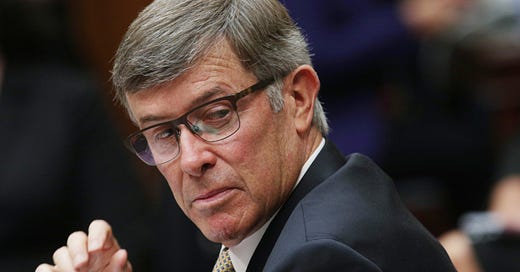

In congressional testimony on Thursday, Acting Director of National Intelligence Joseph Maguire testified that he relied on the advice of both the White House and the DOJ’s Office of Legal Counsel in deciding not to transmit the Ukraine whistleblower’s report to congressional intelligence committees, as he was required to do by the Intelligence Community Whistleblower Protection Act.
Maguire was parachuted into an unholy mess when, practically on his first day of work, he was presented with a whistleblower report implicating the president of the United States in a scheme to pressure Ukraine into providing him with dirt on his likely 2020 presidential opponent in exchange for releasing military aid to Ukraine.
There was not only a whistleblower report, but also a finding by the Intelligence Committee Inspector General that the report was both credible and involved a matter of urgent concern. Under the plain language of the Whistleblower Protection Act, Maguire was required to transmit the report to the intelligence committees of congress within seven days.
But Maguire didn’t do that.
Instead, he reached out first to the White House counsel, and then to the DOJ’s Office of Legal Counsel for advice.
Seeking advice and direction from Donald Trump and William Barr about how to handle a whistleblower report that alleged misconduct by them (Attorney General Barr, while not the primary subject of the whistleblower’s report, was clearly implicated as being central to the scheme) was a shocking display of poor judgment and a complete failure to understand what the whistleblower process is all about.
The whole purpose of a whistleblower process is to provide the whistleblower with a safe, independent platform to report illegal conduct by a government official.
By seeking direction on how to handle the whistleblower’s allegations from the very government officials who had allegedly committed the misdeeds—the White House and the Department of Justice—Maguire turned the whistleblower process on its head. Instead of an independent official deciding what to do with a whistleblower’s allegations of misconduct by government officials, the government officials under scrutiny got to decide how to handle their own cases. Trump and Barr became, in effect, their own judges.
And aside from being tainted by conflicts of interest, the advice Maguire sought, obtained and followed was questionable, at best.
The OLC opinion, also released on Thursday, concluded that there was no statutory obligation for Maguire to transmit the whistleblower’s report to Congress because it didn’t meet the Whistleblower Act’s definition of “urgent concern.”
This decision is not as subjective as you might think. Under the Intelligence Whistleblower Act, “urgent concern” is a defined term referring to a problem or abuse “relating to the funding, administration, or operation of an intelligence activity within the responsibility and authority of the Director of National Intelligence involving classified information.”
Does an alleged scheme by a president of the United States to pressure a foreign power to interfere with an American presidential election “relate to” the “operation of an intelligence activity” within the responsibility and authority of the Director of National Intelligence?
Of course it does.
As the OLC opinion admits, “the intelligence community, under the DNI’s direction, protects against intelligence activities directed against the United States, including foreign efforts to interfere in our elections.”
So how could the OLC conclude that this wasn’t a matter of “urgent concern” under the applicable decision?
Easy: They applied a phony, non-existent standard.
According to the OLC, the urgent-concern provision permits allegations of abuses “arising from within the U.S. intelligence community.” Because in this case the alleged offender is the president of the United States the OLC contends that he is “not a member of the intelligence community.” Even though the president is in charge of the intelligence community. Therefore, OLC determined that the matter could not qualify as an “urgent concern” under the statute.
But nothing in the Act requires that the alleged abuse must have occurred “within the U.S. intelligence community”—or says that it must involve a “member” of the intelligence community. Rather the Act says that the conduct in question must “relate to” intelligence activity within the responsibility and authority of the DNI. And the conduct in question here manifestly relates to intelligence activity within the DNI’s responsibility—namely foreign efforts to interfere with U.S. elections.
The OLC was trying to torture the meaning of the law by reading something into it that wasn’t there.
Maguire probably can’t be faulted for following bad legal advice. He’s not a lawyer himself and it’s understandable that he would reach out for legal advice to guide him through an admittedly thorny situation.
But he can and should be faulted for seeking that advice from the very people whose conduct was called into question by the whistleblower. Their conflict of interest could not have been more blatantly obvious.
Once Maguire decided to let the inmates run the asylum, the outcome was all but predetermined.
Maguire isn’t a bad guy. In fact, by every indication, he’s a good guy, trying his best to do a difficult job that he never asked for.
But we can fairly question Maguire’s judgment without questioning his integrity.
And in this case, his judgment was terrible.










